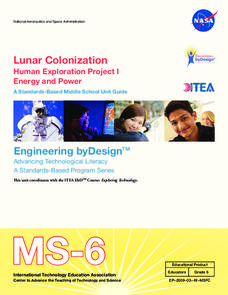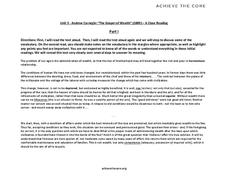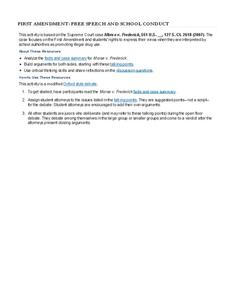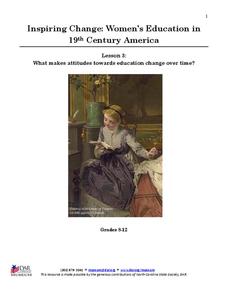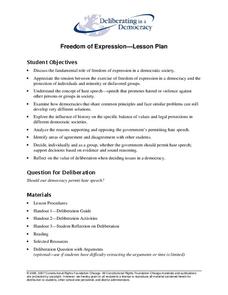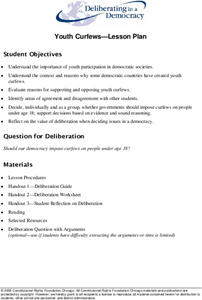EngageNY
Grade 10 ELA Module 1: Unit 3, Lesson 5
Even the most rigid expectations come from a place of deeply held values. In a key chapter of Amy Tan's The Joy Luck Club, explore the ways that Jing-Mei's mother's parental expectations affect her relationship with Jing-Mei. Tenth...
EngageNY
Grade 9 ELA Module 2, Unit 2, Lesson 9
How can a prophecy be true if the future differs from what was foreseen? Sophocles entertains this question in Oedipus the King. Teiresias, Creon, and Oedipus have weighed in on the unsolved murder of Laius, and now Jocasta voices her...
NASA
Lunar Colonization
A five-lesson unit challenges teams to design a complex to allow people to colonize the Moon. The teams first work in order to understand the challenge before becoming experts. Expert teams learn about different aspects needed to survive...
Novelinks
Tuck Everlasting: Herber Readiness
Begin your unit on Natalie Babbitt's Tuck Everlasting with a pre-reading activity about the novel's themes. As class members ponder five questions that reflect the book's themes, they talk about their opinions in a class discussion.
Curated OER
The Gospel of Wealth by Andrew Carnegie: A Close Reading
Andrew Carnegie's "The Gospel of Wealth" provides high schoolers an opportunity to engage more complex text. After a close reading of the essay and an analysis of Carnegie's argument that the rich are superior because they earn money,...
C-SPAN
Electoral College Pros/Cons and Alternatives
If every vote counts, why do we need the electoral college? Middle and high schoolers study the Constitutional precedent of the electoral college, as well as its place in historical and modern elections, with an engaging social studies...
EngageNY
Calculating Conditional Probabilities and Evaluating Independence Using Two-Way Tables (part 2)
Without data, all you are is another person with an opinion. Show learners the power of statistics and probability in making conclusions and predictions. Using two-way frequency tables, learners determine independence by analyzing...
C-SPAN
The Electoral College and the Constitution
What is the purpose of the Electoral College? Is it antiquated, or does it have a place in today's political climate? High schoolers view a series of video clips as they analyze the parts of the United States Constitution that address...
Global Oneness Project
The Consciousness of Nature
Scholars voice their opinions about animal consciousness with an article that challenges common ideas about nature. After reading the article, learners engage in a thoughtful discussion before writing out their arguments in a persuasive...
Administrative Office of the US Courts
Morse v. Frederick
If you stop a student from expressing views that advocate drug use, are you violating their right to free speech? Use the 2007 Supreme Court case Morse v. Frederick to discuss a nuanced interpretation of the First Amendment. Learners...
EngageNY
Grade 9 ELA Module 4, Unit 1, Lesson 18
As first-year students continue to investigate how sugar changed the world, the focus shifts to a consideration of why people with limited job options take on dangerous or subjugating work. Class members read an opinion piece by Nicholas...
Prestwick House
Rhetorical Devices in Political Speeches
Have you ever watched a political speech and felt your heart beat a little faster, and your opinion either solidify or begin to slightly change? Rhetorical devices can be a strong tool in an effective and powerful speech. A short lesson...
EngageNY
Grade 9 ELA Module 4, Unit 1, Lesson 12
Anna McMullen's opinion piece "Bangladesh Factory Collapse: Who Really Pays for our Cheap Clothes?" offers readers another opportunity to examine how writers craft and support their arguments. After reading McMullen's article, class...
National Constitution Center
Abraham Lincoln's Crossroads
History enthusiasts participate in an interactive website that brings Abraham Lincoln to life as he shares his personal experiences between 1854-1864. Scholars listen and read carefully to form their own opinions and discover if they...
Mr. Nussbaum
THE Founding Father
Who is the founding father—George Washington, Thomas Jefferson, or Benjamin Franklin? Scholars decide which of three early Americans, should be crowned the founding father of America based on research. Then, they compose a persuasive...
National Society Daughters of the American Revolution
Lesson 3: What Makes Attitudes Towards Education Change over Time?
The struggle for women's rights is not unique to this generation, or even to the 20th century. Class members explore the conflicting opinions of Alexander Graham Bell and his wife, Mabel Hubbard Bell, regarding women's pursuits of higher...
Administrative Office of the US Courts
Hazelwood v. Kuhlmeier
Freedom of speech is not always free. Scholars investigate how the First Amendment provides for the right to express opinions. Through the court case Hazelwood v. Kuhlmeier, they analyze free speech using primary documents—and hopefully...
Deliberating in a Democracy
Freedom of Expression
Should democracies include hate speech as a protected right? Scholars analyze the rights found under the First Amendment to the Constitution through researching evidence. Freedom of expression becomes the focal point of the...
Deliberating in a Democracy
Marriage and the State
What defines marriage in society? Scholars investigate the moral and legal arguments of what defines marriage. They analyze different marriage traditions and social customs around the world along with Supreme Court decisions. Individuals...
Deliberating in a Democracy
National Service
Uncle Sam wants you to serve! Scholars investigate the role of mandatory national service in an open democracy. They research, watch a video, and hold a debate surrounding the issue of requiring one year of service to gain a better...
Deliberating in a Democracy
Recycling
How often have you passed by a recycling container in your school? Scholars research the issue of recycling in the ever-changing global world. Using documentation and video evidence, they form their own opinions on recycling and how it...
Deliberating in a Democracy
Surveillance
Big Brother is always watching you! Scholars analyze the impact security cameras have on the legal system in a democracy. Primary documentation, case studies, and video clips investigate the use of video in prosecution and provide an...
Deliberating in a Democracy
Youth Curfews
Don't stay out too late! Scholars analyze the need for youth curfews in a democratic society. They examine primary documents, case studies, and short video clips to form their opinions and take a position on the issue. Holding a class...
PBS
Elizabeth Cady Stanton: Orator, Author, and Activist
Have you ever felt like your opinion doesn't count? Scholars research and analyze the impact Elizabeth Cady Stanton had on women's rights. Primary and secondary sources as well as video clips give individuals a clear picture of Stanton's...
Other popular searches
- Fact and Opinion
- Fact Opinion
- Fact Opinion Lesson Plans
- Fact or Opinion
- Fact vs. Opinion
- Fact and Opinion Passages
- Fact Opinion Worksheet
- Fact and Opinion Lessons
- Opinion Writing
- Teaching Fact vs. Opinion
- Fact vs Opinion
- Fact and Opinion Worksheets




